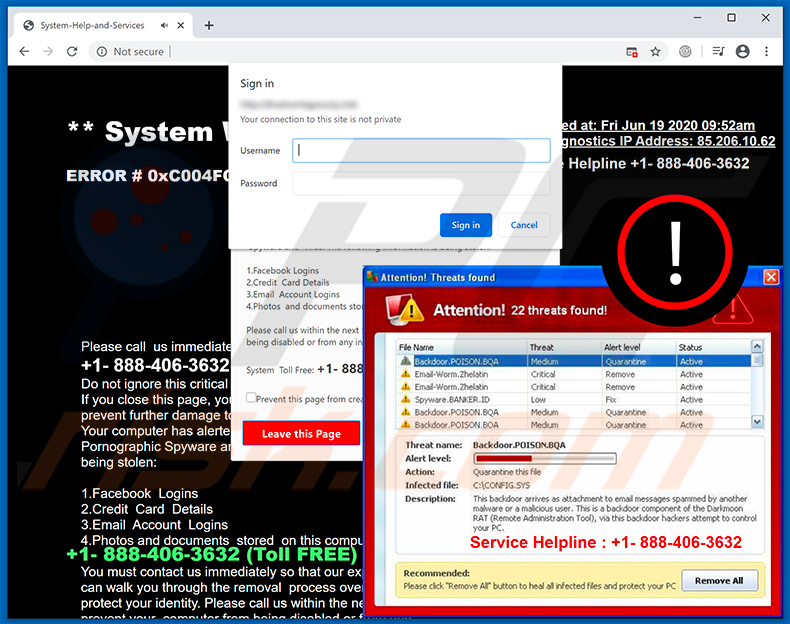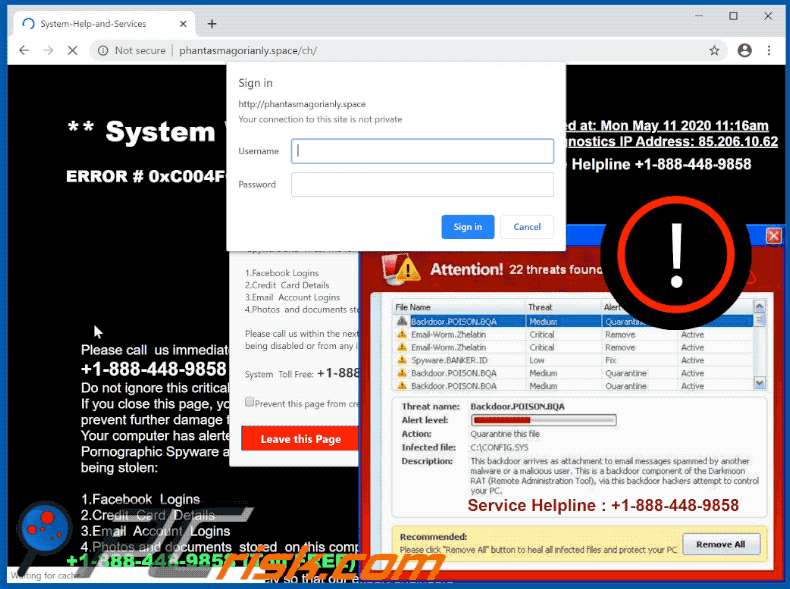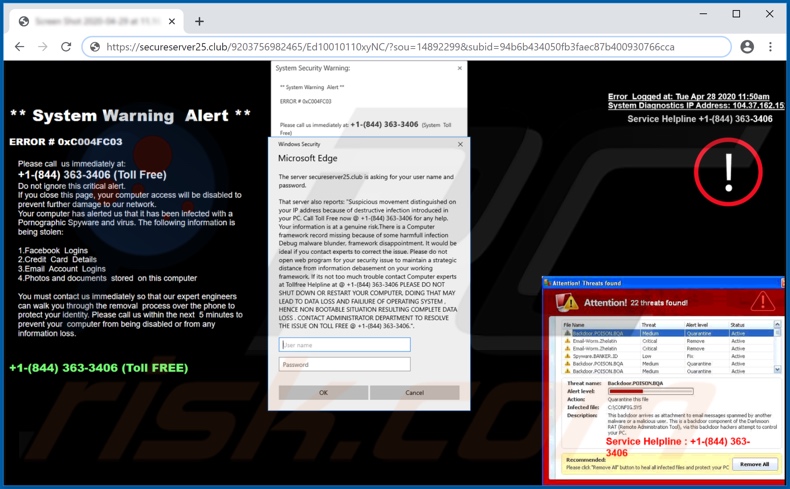How to remove redirects to "Attention 22 threats found" scam sites
Phishing/ScamAlso Known As: "Attention 22 threats found" tech support scam
Get free scan and check if your device is infected.
Remove it nowTo use full-featured product, you have to purchase a license for Combo Cleaner. Seven days free trial available. Combo Cleaner is owned and operated by RCS LT, the parent company of PCRisk.com.
What is the "Attention 22 threats found" scam?
"Attention 22 threats found" is a technical support scam run on deceptive websites. It makes claims that "22 threats" have been detected on the users' devices to trick them into calling a fake tech support line. No web page can detect threats/issues present on a visitor's system.
Any that make such statements are scams. Therefore, you are expressly advised against trusting the "Attention 22 threats found" scheme. Typically, users access these deceptive web pages though redirects caused by intrusive ads or Potentially Unwanted Applications (PUAs).

When a website, promoting "Attention 22 threats found" scam is entered, it displays several pop-up windows. The pop-up in the right corner of the web page states that more than a dozen threats have been detected and are present on the visitor's device. They range from spyware to remote access Trojans (RATs).
Therefore, users are instructed to contact the service helpline immediately and quarantine the infected file, as cyber criminals have allegedly gained access/control over the infected system, or might attempt to do so soon. The pop-up window asks for user account credentials (i.e., username and password). It reiterates that the device is at risk due to serous infections.
This pop-up also instructs people not to open any browsers to avoid having more information exposed to the supposed viruses. Users are urged multiple times to call the provided toll-free telephone number so that "computer experts" can resolve the issues.
Additionally, they are informed that shutting down or restarting/rebooting the device can lead to system failure and/or permanent data loss. The text presented in the background page instructs users not to ignore the critical alert or to close this web page. The latter will result in loss of access to their device, as prevention measure against further damage to the network.
Supposedly, the system has been infected with pornographic spyware and other viruses, which are in the process of exfiltrating email and Facebook account credentials, stored photographs and documents, and credit card details. To prevent loss of data and access, users are urged to call the number within five minutes.
As mentioned, "Attention 22 threats found" is a scam and the information provided by it is false. Despite any claims to the contrary, fake technical support lines are often expensive.
Furthermore, scammers can trick callers into paying additional fees for "services rendered", request that they reveal personal information (e.g. names, locations, emails, banking account or credit card details, etc.), try to gain unauthorized access to the device and/or infect it with actual malware.
Trusting this scam can lead to system infections, financial loss, serious privacy issues and even identity theft. You are advised to simply ignore the scheme and close the site.
In some cases, it might be impossible to normally close these web pages. In this case, use Task Manager to end the browser process and choose not to restore the previous browsing session upon reopening it (to prevent the initial problem from reoccurring).
PUAs can force-open various deceptive/scam, sale-oriented, untrusted, rogue, compromised and malicious websites, however, these unwanted applications have additional capabilities. Some types (adware) can enable the placement of intrusive advertisements on any visited page.
In addition to being a nuisance, these ads redirect to harmful sites and stealthily download/install PUAs when clicked. Another type (browser hijacker) modifies browser settings and limits/denies access to settings in order to promote bogus search engines. Furthermore, most PUAs also have data tracking functions.
They can monitor and collect browsing-related information such as URLs visited, search queries typed, geolocations, IP addresses and other sensitive details. The gathered data is often shared with, or sold to, third parties seeking to similarly misuse it for profit.
You are strongly advised to remove all suspicious applications and browser extensions/plug-ins immediately upon detection.
| Name | "Attention 22 threats found" tech support scam |
| Threat Type | Phishing, Scam, Social Engineering, Fraud. |
| Fake Claim | Scam claims users' devices have been infected with multiple viruses. |
| Tech Support Scammer Phone Number | +1-8-(844) 363-3406 |
| Related Domains | secureserver25[.]club |
| Detection Names (secureserver25[.]club) |
Emsisoft (Phishing), Fortinet (Phishing), Kaspersky (Malware), Netcraft (Malicious), Full List Of Detections (VirusTotal). |
| Symptoms | Fake error messages, fake system warnings, pop-up errors, hoax computer scan. |
| Distribution methods | Compromised websites, rogue online pop-up ads, potentially unwanted applications. |
| Damage | Loss of sensitive private information, monetary loss, identity theft, possible malware infections. |
| Malware Removal (Windows) |
To eliminate possible malware infections, scan your computer with legitimate antivirus software. Our security researchers recommend using Combo Cleaner. Download Combo CleanerTo use full-featured product, you have to purchase a license for Combo Cleaner. 7 days free trial available. Combo Cleaner is owned and operated by RCS LT, the parent company of PCRisk.com. |
"Activation Warning Alert", "WARNING! 36 infections found!!!" and "Your Windows 10 is infected with 5 viruses!" are some examples of other tech support scams. The internet is rife with deceptive web pages and the schemes run on them are varied.
In essence, they use social engineering and scare tactics to trick users into performing certain actions (e.g. calling fake support/service lines, downloading/installing and purchasing untrusted or malicious content, revealing personal information and so on).
Regardless of what the scams claim or demand, their purpose is identical: to generate revenue for the designers. Therefore, exercising caution when browsing is crucial.
How did potentially unwanted applications install on my computer?
Some PUAs have "official" promotional pages from which they can be downloaded. They can also be downloaded/installed with other products. "Bundling" is the term used to define this deceptive marketing tactic of packing unwanted/malicious content together regular software.
Despite the presence of opt-out options and additions, rushing downloads/installations (e.g. ignoring terms, skipping steps, etc.) endangers systems with potential infiltration and infections. Once clicked, intrusive advertisements can execute scripts designed to download/install PUAs without users' permission.
How to avoid installation of potentially unwanted applications
It is important to research all products before download/installation or purchase. All downloads should be performed only from official and verified sources. Unofficial and free file-hosting sites, Peer-to-Peer sharing networks and other third party downloaders can offer deceptive/bundled content, and thus should be avoided.
When downloading/installing, you are advised to read the terms, study available options, use the "Custom/Advanced" settings and opt-out of additional apps, tools, functions, etc. Intrusive ads rarely seem suspicious, however, they can redirect to various dubious web pages (e.g. gambling, pornography, adult-dating and others).
If you encounter these ads/redirects, check the system and immediately remove all dubious applications and browser extensions/plug-ins. If your computer is already infected with PUAs, we recommend running a scan with Combo Cleaner Antivirus for Windows to automatically eliminate them.
Appearance of "Attention 22 Threats Found" pop-up scam (GIF):

Text presented in "Attention 22 threats found" pop-up:
Attention! Threats found
Attention! 22 threats found!
File Name Threat Alert level Status
Backdoor.POISON.BQA Medium Quarantine Active
Email-Worm.Zhelatin Critical Remove Active
Email-Worm.Zhelatin Critical Remove Active
Spyware.BANKER.ID Low Fix Active
Backdoor.POISON.BQA Medium Quarantine Active
Backdoor.POISON.BQA Medium Quarantine Active
Threat name: Backdoor.POISON.BQA
Alert level:
Action: Quarantine this file
Infected file: C:\CONFIG.SYS
Description: This backdoor arrives as attachment to email messages spammed by another malware or a malicious user. This is a backdoor component of the Darkmoon RAT (Remote Administration Tool), via this backdoor hackers attempt to control your PC.
Service Helpline : +1-8-(844) 363-3406
Recommended:
Please click "Removal All" button to heal all infected files and protect your PC
Remove All
Another variant of "Attention 22 Threats Found" pop-up scam:

Instant automatic malware removal:
Manual threat removal might be a lengthy and complicated process that requires advanced IT skills. Combo Cleaner is a professional automatic malware removal tool that is recommended to get rid of malware. Download it by clicking the button below:
DOWNLOAD Combo CleanerBy downloading any software listed on this website you agree to our Privacy Policy and Terms of Use. To use full-featured product, you have to purchase a license for Combo Cleaner. 7 days free trial available. Combo Cleaner is owned and operated by RCS LT, the parent company of PCRisk.com.
Quick menu:
- What is "Attention 22 threats found" tech support scam?
- How to identify a pop-up scam?
- How do pop-up scams work?
- How to remove fake pop-ups?
- How to prevent fake pop-ups?
- What to do if you fell for a pop-up scam?
How to identify a pop-up scam?
Pop-up windows with various fake messages are a common type of lures cybercriminals use. They collect sensitive personal data, trick Internet users into calling fake tech support numbers, subscribe to useless online services, invest in shady cryptocurrency schemes, etc.
While in the majority of cases these pop-ups don't infect users' devices with malware, they can cause direct monetary loss or could result in identity theft.
Cybercriminals strive to create their rogue pop-up windows to look trustworthy, however, scams typically have the following characteristics:
- Spelling mistakes and non-professional images - Closely inspect the information displayed in a pop-up. Spelling mistakes and unprofessional images could be a sign of a scam.
- Sense of urgency - Countdown timer with a couple of minutes on it, asking you to enter your personal information or subscribe to some online service.
- Statements that you won something - If you haven't participated in a lottery, online competition, etc., and you see a pop-up window stating that you won.
- Computer or mobile device scan - A pop-up window that scans your device and informs of detected issues - is undoubtedly a scam; webpages cannot perform such actions.
- Exclusivity - Pop-up windows stating that only you are given secret access to a financial scheme that can quickly make you rich.
Example of a pop-up scam:

How do pop-up scams work?
Cybercriminals and deceptive marketers usually use various advertising networks, search engine poisoning techniques, and shady websites to generate traffic to their pop-ups. Users land on their online lures after clicking on fake download buttons, using a torrent website, or simply clicking on an Internet search engine result.
Based on users' location and device information, they are presented with a scam pop-up. Lures presented in such pop-ups range from get-rich-quick schemes to fake virus scans.
How to remove fake pop-ups?
In most cases, pop-up scams do not infect users' devices with malware. If you encountered a scam pop-up, simply closing it should be enough. In some cases scam, pop-ups may be hard to close; in such cases - close your Internet browser and restart it.
In extremely rare cases, you might need to reset your Internet browser. For this, use our instructions explaining how to reset Internet browser settings.
How to prevent fake pop-ups?
To prevent seeing pop-up scams, you should visit only reputable websites. Torrent, Crack, free online movie streaming, YouTube video download, and other websites of similar reputation commonly redirect Internet users to pop-up scams.
To minimize the risk of encountering pop-up scams, you should keep your Internet browsers up-to-date and use reputable anti-malware application. For this purpose, we recommend Combo Cleaner Antivirus for Windows.
What to do if you fell for a pop-up scam?
This depends on the type of scam that you fell for. Most commonly, pop-up scams try to trick users into sending money, giving away personal information, or giving access to one's device.
- If you sent money to scammers: You should contact your financial institution and explain that you were scammed. If informed promptly, there's a chance to get your money back.
- If you gave away your personal information: You should change your passwords and enable two-factor authentication in all online services that you use. Visit Federal Trade Commission to report identity theft and get personalized recovery steps.
- If you let scammers connect to your device: You should scan your computer with reputable anti-malware (we recommend Combo Cleaner Antivirus for Windows) - cyber criminals could have planted trojans, keyloggers, and other malware, don't use your computer until removing possible threats.
- Help other Internet users: report Internet scams to Federal Trade Commission.
Share:

Tomas Meskauskas
Expert security researcher, professional malware analyst
I am passionate about computer security and technology. I have an experience of over 10 years working in various companies related to computer technical issue solving and Internet security. I have been working as an author and editor for pcrisk.com since 2010. Follow me on Twitter and LinkedIn to stay informed about the latest online security threats.
PCrisk security portal is brought by a company RCS LT.
Joined forces of security researchers help educate computer users about the latest online security threats. More information about the company RCS LT.
Our malware removal guides are free. However, if you want to support us you can send us a donation.
DonatePCrisk security portal is brought by a company RCS LT.
Joined forces of security researchers help educate computer users about the latest online security threats. More information about the company RCS LT.
Our malware removal guides are free. However, if you want to support us you can send us a donation.
Donate
▼ Show Discussion